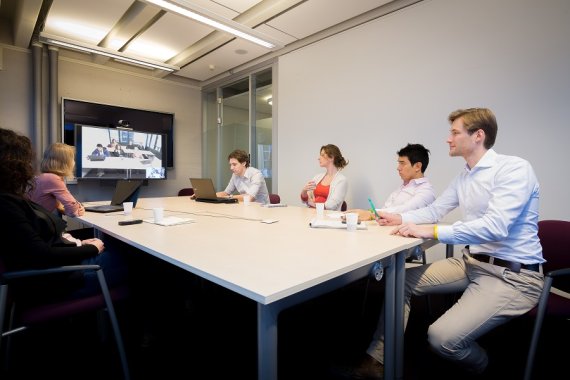The International Environmental Policy Consultancy Project (IEPC) is a unique course at the university. Wageningen students who take this course collaborate with New York State University in America on a project for a real client. The students are required to engage in intensive consultations using video conferencing, Skype, Sharepoint, email and Facebook, culminating in one joint report. This challenge appealed to students Mirle van Huet (Communication Sciences) and Daphne van Dam (Development Studies). They worked on a project for the United Nations at the end of last year, together with six other Wageningen students and the students from New York State.
Division of tasks
One of the main aims of the international collaboration was for the students to form a close-knit group and learn from each other. However, the different time zones and timetables made it difficult to really form one team. The time difference made it difficult to make appointments and the differences between the education systems put the Americans at an advantage. ‘Because the American education system only has two semesters, they had already started in September,’ says Mirle. ‘We started the course in October so we were behind from the start.’ The Wageningen students were able to catch up, though, as they were working fulltime on the project while the Americans were doing it part-time. ‘But because they were taking other courses as well, they were not as committed as we were.’ But even when they were around, there was not much response from the Americans. Daphne: ‘We tried for a long time to form a group, but it was not easy. Forming a close group was more important to us than it was to them. They were mainly working independently of each other, whereas we were sitting in the same office for hours every day.’
 The Wageningen student group. Daphne on the far left and Mirle third from the right (seated)
The Wageningen student group. Daphne on the far left and Mirle third from the right (seated)
.
Deadline
It was considered all part of the process that it should get stuck somewhere along the line, says teacher Machiel Lammers. It was even part of the idea, in fact. ‘Valuable lessons go hand in hand with frustration. When these students graduate, their time of working together in one room on one project will be over. In this course they encounter for the first time the kinds of hurdles you face if you work with international partners. If you work on a European research project, for example, you deal with colleagues who have different amounts of time, energy and money to spend on their contribution.’ There was certainly no lack of time and energy put into this project in Wageningen.
At the start, the Wageningen participants spent 42 hours a week on the project, and that increased as the deadline approached. Mirle: ‘If you didn’t look at your phone for an hour, you had 100 Whatsapp messages.’ Lamers: ‘The students tended to opt for a working method that gave them control over the situation. That works better when you see each other face to face every day and work in the same room all the time. The tendency was not to work too much with the Americans. We tried to make clear to them, however, that they would be graded as a whole group in the end, so that you really do have to do it together.’
In January the students heard that their grade for the course was 9.5. But had it really been a joint effort? Mirle: ‘At some point we really though: “If the Americans don’t come up with anything, we’ll just do it ourselves.’ Lamers acknowledges that the collaboration left a lot to be desired. ‘For this year we have already tried to sort things out so that there will be more collaboration across the Atlantic. Next year, when hopefully this course will be part of the Master’s track on Sustainable Development Diplomacy, we will pay even more attention to that. This is a learning process for us too.’

